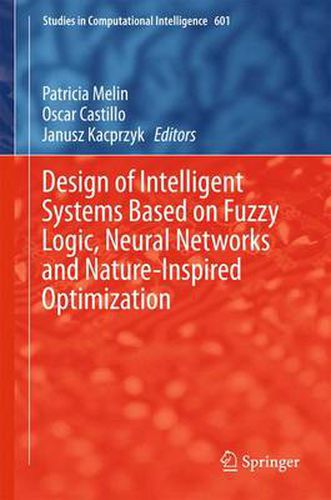Readings Newsletter
Become a Readings Member to make your shopping experience even easier.
Sign in or sign up for free!
You’re not far away from qualifying for FREE standard shipping within Australia
You’ve qualified for FREE standard shipping within Australia
The cart is loading…






This title is printed to order. This book may have been self-published. If so, we cannot guarantee the quality of the content. In the main most books will have gone through the editing process however some may not. We therefore suggest that you be aware of this before ordering this book. If in doubt check either the author or publisher’s details as we are unable to accept any returns unless they are faulty. Please contact us if you have any questions.
This book presents recent advances on the design of intelligent systems based on fuzzy logic, neural networks and nature-inspired optimization and their application in areas such as, intelligent control and robotics, pattern recognition, time series prediction and optimization of complex problems. The book is organized in eight main parts, which contain a group of papers around a similar subject. The first part consists of papers with the main theme of theoretical aspects of fuzzy logic, which basically consists of papers that propose new concepts and algorithms based on fuzzy systems. The second part contains papers with the main theme of neural networks theory, which are basically papers dealing with new concepts and algorithms in neural networks. The third part contains papers describing applications of neural networks in diverse areas, such as time series prediction and pattern recognition. The fourth part contains papers describing new nature-inspired optimization algorithms. The fifth part presents diverse applications of nature-inspired optimization algorithms. The sixth part contains papers describing new optimization algorithms. The seventh part contains papers describing applications of fuzzy logic in diverse areas, such as time series prediction and pattern recognition. Finally, the eighth part contains papers that present enhancements to meta-heuristics based on fuzzy logic techniques.
$9.00 standard shipping within Australia
FREE standard shipping within Australia for orders over $100.00
Express & International shipping calculated at checkout
This title is printed to order. This book may have been self-published. If so, we cannot guarantee the quality of the content. In the main most books will have gone through the editing process however some may not. We therefore suggest that you be aware of this before ordering this book. If in doubt check either the author or publisher’s details as we are unable to accept any returns unless they are faulty. Please contact us if you have any questions.
This book presents recent advances on the design of intelligent systems based on fuzzy logic, neural networks and nature-inspired optimization and their application in areas such as, intelligent control and robotics, pattern recognition, time series prediction and optimization of complex problems. The book is organized in eight main parts, which contain a group of papers around a similar subject. The first part consists of papers with the main theme of theoretical aspects of fuzzy logic, which basically consists of papers that propose new concepts and algorithms based on fuzzy systems. The second part contains papers with the main theme of neural networks theory, which are basically papers dealing with new concepts and algorithms in neural networks. The third part contains papers describing applications of neural networks in diverse areas, such as time series prediction and pattern recognition. The fourth part contains papers describing new nature-inspired optimization algorithms. The fifth part presents diverse applications of nature-inspired optimization algorithms. The sixth part contains papers describing new optimization algorithms. The seventh part contains papers describing applications of fuzzy logic in diverse areas, such as time series prediction and pattern recognition. Finally, the eighth part contains papers that present enhancements to meta-heuristics based on fuzzy logic techniques.